Roman espionage evolved from informal networks into a sophisticated system of intelligence and secret policing, crucial for controlling an empire spanning continents. Rome’s Imperial Spies: Espionage, Surveillance, and Secret Police Tactics showcase how intelligence gathering underpinned political power and military dominance.
Key figures like Julius Caesar and Augustus played pivotal roles in shaping these practices. Caesar employed spies and scouts strategically during military campaigns and political rivalries. Augustus institutionalized intelligence operations by expanding communication networks, enabling surveillance across vast territories.
Intelligence was not merely about battlefield advantage; it was essential for maintaining imperial authority, monitoring political threats, and managing distant provinces. The integration of espionage into Rome’s governance helped preserve stability in an empire marked by complexity and constant challenges.
This article unpacks the development of Rome’s secret police tactics and imperial spies, revealing methods that influenced intelligence systems for centuries.
The history of the Roman Republic and Empire is a fascinating subject that encompasses various aspects such as governance, economy, religion, and engineering.
Governance: The Transition from Monarchy to Complex Political Structure
The structure of power during the Roman Republic marked a significant transition in governance from monarchy to a complex political structure. This system laid the foundation for modern democracies and established key principles of governance that resonate today.
Economy: The Crucial Role of Agriculture
Agriculture played a crucial role in Roman economic growth, serving as a driver of Rome’s economic and social development. This sector extended beyond mere food production, influencing various aspects of Roman life.
Religion: A Comprehensive System Influencing All Aspects of Life
Religion, too, was an integral part of the Roman identity. It was not merely a set of beliefs but a comprehensive system that intertwined with every aspect of their lives, influencing politics, culture, and social structures throughout the Republic and Empire.
The Rise and Fall: Shaping Politics, Culture, and Society
The history of Rome is also marked by its vast rise and fall, which spanned over a millennium. This ancient civilization has left an indelible mark on the world, shaping politics, culture, and society in ways that continue to resonate today.
Engineering: Remarkable Feats Changing the World
Lastly, the Romans were known for their remarkable engineering feats. These incredible Roman engineering feats not only changed the world but also served as a foundation for contemporary infrastructure systems, ensuring effective governance and cultural exchange across far-flung regions.
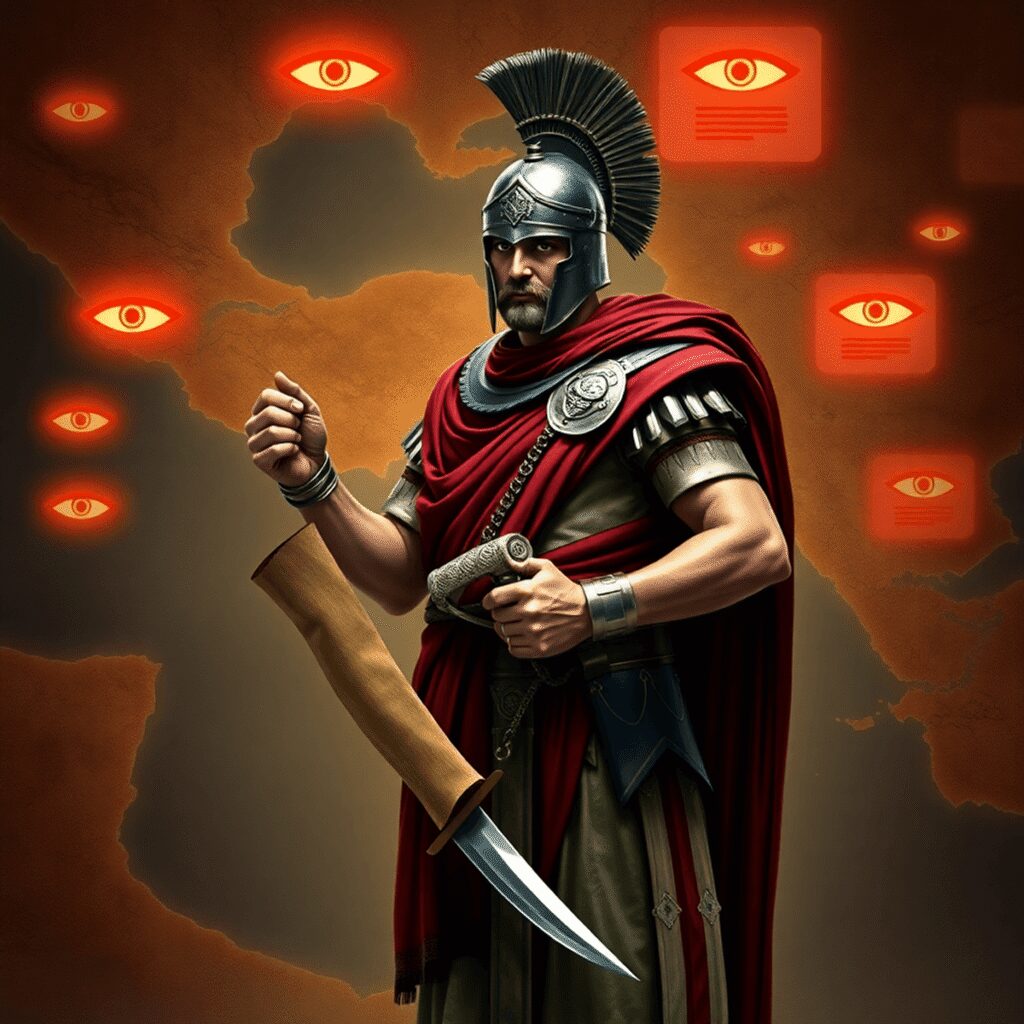
Caesar and Augustus: Pioneers of Coordinated Intelligence Operations
Julius Caesar espionage tactics marked a turning point in Roman intelligence. His military campaigns demanded precise and timely information about enemy movements, morale, and terrain. Caesar employed a network of spies, scouts, and couriers who operated both on the battlefield and within political circles. These agents gathered intelligence that allowed him to outmaneuver rivals like Pompey and secure victories that cemented his power.
Key characteristics of Caesar’s approach included:
- Use of scouts to survey enemy camps and report back with detailed observations.
- Deployment of couriers to swiftly transmit messages across vast distances.
- Infiltration by undercover agents into opposing factions for political insights.
- Implementation of rudimentary codes and ciphers to protect sensitive communications from interception.
The political dimension of Julius Caesar espionage was as crucial as its military application. He understood intelligence as a tool for manipulating public opinion, monitoring senators, and preempting conspiracies against him.
Augustus inherited these foundations and transformed them into a more structured intelligence system. Recognizing the need for reliable communication across the sprawling Roman Empire, he established the cursus publicus, a state-managed postal service designed to expedite official correspondence securely. This network connected provincial governors, military commanders, and imperial administrators.
Features of Augustus intelligence system included:
- A centralized courier service with relay stations positioned every few miles along major roads.
- Strict control over message delivery to prevent leaks or delays.
- Integration with military reconnaissance units ensuring rapid flow of battlefield intelligence.
- Expansion beyond military use into civil administration surveillance.
By institutionalizing secure communication through the cursus publicus, Augustus ensured that intelligence reached decision-makers promptly. This advancement helped maintain imperial cohesion and enabled more effective responses to internal unrest or external threats. The groundwork laid by Caesar’s ad hoc espionage evolved under Augustus into an enduring model combining logistics, surveillance, and political oversight.
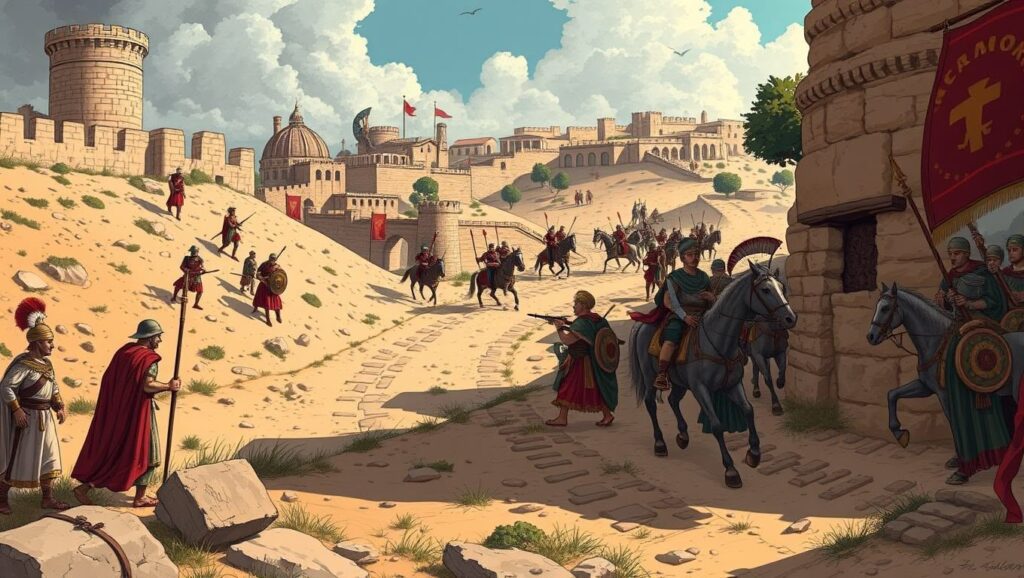
The Role of Speculatores in Roman Military Espionage
The speculatores were essential operatives within the Roman military intelligence framework. Tasked primarily as couriers, they ensured rapid and secure communication between commanders and military units, an indispensable function for coordinated battlefield maneuvers. Their role extended beyond message delivery to encompass covert reconnaissance and espionage activities.
Key responsibilities of speculatores included:
- Gathering intelligence on enemy forces: They infiltrated enemy camps and positions, observing troop movements, fortifications, and supply lines. This information was crucial for planning Roman military strategy.
- Conducting undercover operations: Speculatores operated behind enemy lines to sabotage, spread disinformation, or capture key individuals. Their ability to blend in and move undetected made them effective spies.
- Performing internal surveillance: Within the Roman army itself, they monitored loyalty among soldiers and officers, identifying potential threats or conspiracies against commanders.
These agents were selected for their physical endurance, discretion, and loyalty. Equipped with skills in stealth and intelligence gathering, speculatores embodied an early form of Rome’s Imperial Spies: Espionage, Surveillance, and Secret Police Tactics that combined open military functions with clandestine activities.
Their work provided critical advantages during campaigns by supplying commanders with timely and accurate information. The dual nature of their duties—as trusted messengers and secret operatives—illustrates how espionage was integrated into military operations long before formal intelligence agencies existed.
The effectiveness of these operations was greatly enhanced by the Roman Army, a symbol of military power that played a crucial role in the growth and upkeep of the Roman Empire. The army’s structure, strategies, and operational effectiveness were key in achieving victories across large areas.
Furthermore, the Roman roads served as vital arteries for these military campaigns. These roads not only facilitated the movement of troops but also played a significant role in maintaining and expanding the empire.
While the speculatores operated primarily within military contexts, it is important to remember that their activities were also influenced by broader societal structures. For instance, the legal status of Roman women reflected a complex interplay of rights and restrictions that significantly influenced gender dynamics in ancient Rome. This legal framework surrounding Roman women often intertwined with other societal roles, including those within the military sphere.
Lastly, it’s fascinating to consider how Roman mythology, which was deeply ingrained in their culture and societal norms, could have influenced various aspects of life during this period including military operations and espionage tactics.
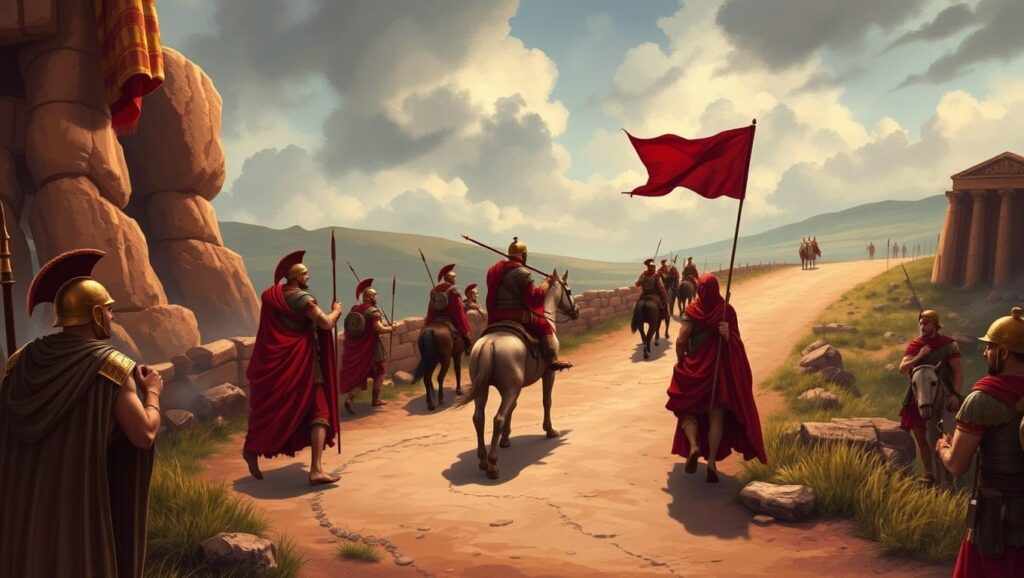
From Grain Couriers to Secret Police: The Evolution of Frumentarii
The frumentarii started as an important part of the Roman military system. Their main job was to manage the grain supply, which was crucial for keeping troops well-fed and ready for action. The word “frumentarii” comes from the Latin word frumentum, meaning grain. These individuals primarily served as couriers, responsible for delivering messages and supplies between different military units and provincial commands.
Expansion of Duties under Emperors
During the reigns of emperors like Domitian and Hadrian, the role of the frumentarii expanded significantly. They evolved into a secretive force often referred to as the Roman secret police. In this new capacity, the frumentarii played a key role in conducting surveillance on behalf of imperial authorities, keeping an eye on not just military personnel but also civilian populations and provincial governors.
Their responsibilities grew to include:
- Gathering intelligence on potential threats to the emperor’s rule
- Investigating dissent or rebellion within the provinces
- Enforcing imperial decrees through covert operations
- Acting as informants and enforcers within local communities
This dual function—supporting military logistics while also serving as a means of political control—gave the frumentarii considerable power. Their presence instilled fear in both soldiers and civilians because of their reputation for secrecy and brutality.
Covert Operations and Influence
The frumentarii often operated in secret, blending into different environments to gather information without raising suspicion. Their reports had a direct impact on decisions made by high-ranking officials, making them one of the empire’s most effective tools for maintaining order across vast territories.
The expansion of their role demonstrates how Rome adapted existing systems for intelligence purposes, transforming a supply service into a widespread surveillance network essential for imperial stability.
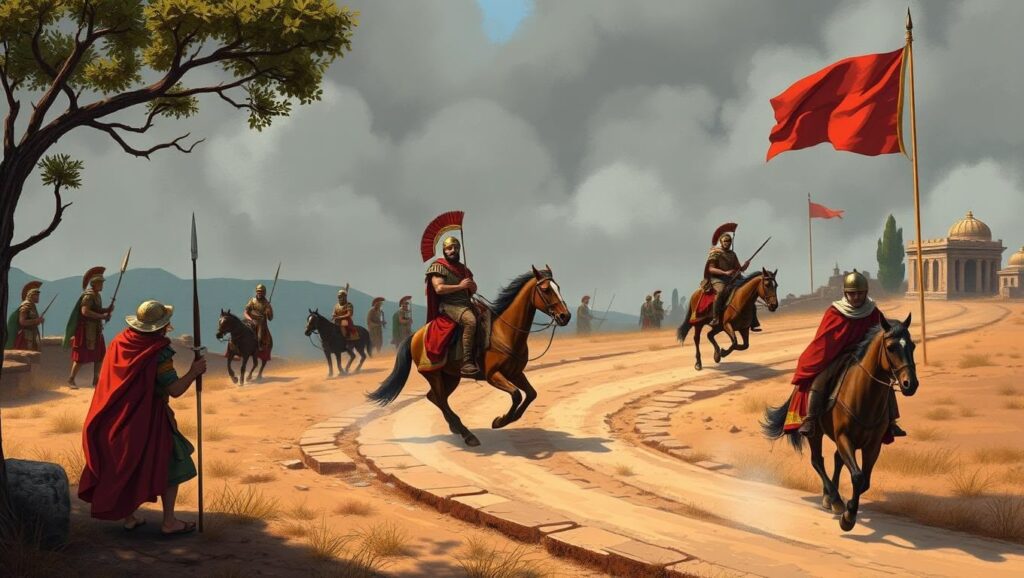
Agentes in Rebus: Civilian Spies in Diocletian’s Rome
Diocletian’s reforms marked a turning point for Roman intelligence. The frumentarii, once vital as military couriers and secret police, had become notorious for corruption and abuse of power. Their disbandment reflected the emperor’s push to restore order and accountability within imperial surveillance. In their place rose the agentes in rebus, a civilian corps designed to monitor government activities with tighter oversight.
These agents operated under the supervision of the magister officiorum, a senior official responsible for managing multiple intelligence and administrative departments. Unlike their predecessors, agentes in rebus were integrated into the bureaucratic structure, tasked with:
- Conducting surveillance across various government ministries
- Reporting on officials’ conduct and potential disloyalty
- Facilitating communication between imperial offices
- Enforcing secret policing functions discreetly
Despite increased regulation, agentes in rebus maintained a feared presence. Their civilian status allowed them to blend into administrative circles, gathering sensitive information without drawing attention. They often acted as inspectors, arbiters of loyalty, and enforcers of imperial policies behind the scenes.
This system reflected Diocletian’s emphasis on centralizing power while attempting to curb unchecked abuses seen under the frumentarii. The agentes in rebus embodied a more sophisticated, bureaucratized model of espionage that balanced surveillance with control—an evolution that shaped later imperial intelligence methods.
The landscape they operated in was heavily influenced by the social class divide prevalent in ancient Rome. A detailed exploration of this divide reveals how daily life varied significantly for different social classes, particularly between the wealthy patricians and the working-class plebeians. The patricians, who were usually rich landowners, held significant power and luxury in society, which starkly contrasted with the experiences of the plebeians. Understanding this social stratification provides valuable context to comprehend the dynamics within which agentes in rebus functioned.
As these civilian spies navigated through various government ministries conducting surveillance and reporting on officials’ conduct, it was essential for them to understand the existing social class divide within Roman society. This knowledge would help them blend into administrative circles more effectively, gather sensitive information without drawing attention, and enforce imperial policies with a better understanding of the socio-economic landscape.
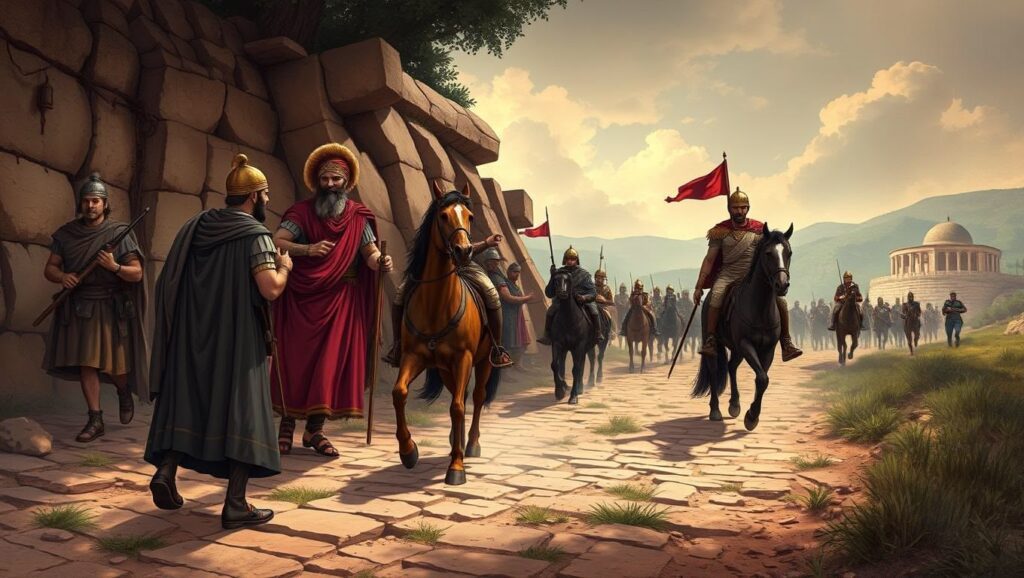
Espionage Tactics Employed by Rome’s Imperial Spies
Roman agents employed a variety of sophisticated tactics to gather intelligence and maintain control. These methods reveal the depth of Rome’s Imperial Spies: Espionage, Surveillance, and Secret Police Tactics in action.
1. Infiltration Techniques
Agents disguised themselves to penetrate enemy camps or cities. They often posed as traders, slaves, or local inhabitants to avoid suspicion. This allowed them to collect strategic information on troop movements, fortifications, and supply lines without detection.
2. Covert Surveillance Rome
Within the city itself, spies conducted discreet observations on political figures, potential rebels, and dissidents. Surveillance was carried out in public spaces such as forums and baths using informants embedded in various social strata. The frumentarii and agentes in rebus were known for blending into civilian life while secretly reporting suspicious activities.
3. Secret Communications Rome
Secure transmission of information was crucial. Methods included coded messages using simple ciphers or substitution alphabets known only to trusted individuals. Invisible ink derived from natural substances like fruit juices enabled letters to hide sensitive content from unintended readers. Hand signals and prearranged gestures also complemented written codes for real-time communication between agents.
4. Use of Couriers and Relay Systems
The cursus publicus postal system ensured rapid delivery of intelligence across vast distances. Couriers sometimes traveled disguised or concealed their messages within everyday objects to avoid interception by hostile forces.
5. Psychological Operations
Disinformation campaigns were occasionally launched to confuse enemies or political adversaries. Planting false rumors through controlled channels manipulated perceptions and decisions at critical moments.
These espionage tactics demonstrate how Rome combined military precision with cunning subterfuge to secure its empire. The blend of covert surveillance Rome practiced alongside innovative communication methods illustrates the advanced nature of intelligence operations that underpinned imperial stability.
For a deeper understanding of these historical events, you might want to explore more about the fascinating world of Ancient Rome at Men of Pompeii, which offers engaging content that brings the past to life.
The Legacy of Roman Espionage: Influence on Modern Intelligence Systems
Ancient Rome’s sophisticated approach to espionage laid the groundwork for many modern intelligence practices. The integration of military scouts, courier networks, and secret police like the frumentarii and agentes in rebus illustrate early forms of state surveillance and centralized intelligence gathering still relevant today.
Key takeaways from Rome’s Imperial Spies:
- Effective security measures: Coordinated communication systems such as the cursus publicus enabled rapid information flow across vast territories. This ensured timely responses to external threats and internal dissent.
- Institutionalized surveillance: Rome formalized spying within its bureaucracy and military, creating specialized roles that anticipated modern secret services.
- Power dynamics and risks: The history of Roman espionage also highlights how intelligence agencies can become tools of oppression. Abuses by groups like the frumentarii demonstrate risks of unchecked authority, a cautionary lesson for contemporary states.
Roman espionage’s legacy remains a double-edged sword, offering both a blueprint for security and a warning about the concentration of power in secret police forces. This legacy is part of a broader narrative about how Ancient Rome shaped Western civilization, influencing various aspects of modern society including governance, law, and philosophy.
For instance, the Corpus Juris Civilis, a significant legal codification commissioned by Emperor Justinian I in the 6th century AD, preserved ancient Roman legal principles while adapting them to contemporary needs. This marked a crucial turning point in the development of legal systems in Europe.
Moreover, figures like Scipio Africanus, known for his crucial role in the Second Punic War, exemplify how strategic military decisions can alter the course of history. His victory over Hannibal not only established Rome’s dominance over Carthage but also had far-reaching consequences for the Mediterranean region.
Additionally, the philosophical ideas stemming from Stoicism, which emphasized living in harmony with nature and using reason as paths to achieving human flourishing, became influential in Roman culture and continue to resonate today.
FAQs (Frequently Asked Questions)
What role did Julius Caesar and Augustus play in the development of Roman espionage?
Julius Caesar strategically utilized spies, scouts, and couriers for military campaigns and political maneuvering, laying the groundwork for Roman intelligence. Augustus expanded upon Caesar’s foundations by establishing a more organized intelligence apparatus, including the cursus publicus postal system that facilitated secure communication across the vast Roman Empire.
How did espionage function during the Roman Republic without a formal intelligence service?
During the Roman Republic, there was no formalized intelligence service. Instead, private networks operated mainly through senatorial families who gathered information on political rivals and foreign powers. These early informants employed methods such as scouts, couriers, and envoys to collect valuable intelligence.
Who were the speculatores and what was their importance in Roman military espionage?
Speculatores were specialized military spies serving as couriers and undercover agents within the Roman army. They played a crucial role in gathering vital information about enemy forces and conducting covert operations behind enemy lines, contributing significantly to Rome’s imperial espionage efforts.
How did the frumentarii evolve from grain couriers to secret police in ancient Rome?
Originally serving as a military grain supply service, the frumentarii evolved into an intelligence agency under emperors like Domitian and Hadrian. They took on dual roles supporting military logistics and enforcing imperial authority through surveillance activities, effectively acting as Rome’s secret police.
What reforms did Emperor Diocletian implement regarding Roman intelligence agencies?
Emperor Diocletian reformed Roman intelligence by disbanding the frumentarii due to abuses of power. He established the agentes in rebus, civilian agents tasked with surveillance across government ministries. These agents operated with greater oversight but continued engaging in secret policing activities within the empire.
What espionage tactics were commonly employed by Rome’s imperial spies?
Roman imperial spies utilized various sophisticated tactics including infiltration into enemy camps or cities, covert surveillance operations within Rome itself, and innovative secure communication methods such as coded messages and invisible ink. These strategies enhanced Rome’s ability to maintain control over its vast territories.

